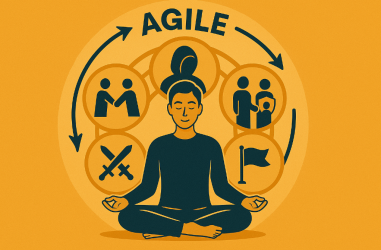
Some time ago I worked with a team where one of the programmers was extremely thorough. He cared a lot about something he called “technical excellence”. He believed that the code should be written in a way that would not cause any problems in the future or raise any doubts. You may say – “But that’s how it should be”. Hmmm… As with everything – it depends 🙂
The problem occurred when something went wrong, the team came across a piece of code that had to be rebuilt immediately, or something broke and a very quick reaction was necessary. The pressure caused resistance. Arguments based on business needs, which sometimes required patching code, did not appeal to my colleague. Strong emotions arose and conflicts often began between him and the Product Owner, and sometimes the rest of the team. Meanwhile, it was not about the code, but about the beliefs that the programmer had about himself.
Value System and Identity
Each person’s value system is a unique set of beliefs that shape their identity. These values can include moral, ethical, religious, cultural and personal beliefs about what is important and valuable in life, what kind of person I am. For someone, family values may be a priority, for someone else personal freedom, and for yet another person being the best programmer.
A person’s identity is more than just a sum of values; it is a sense of who you are, what your goals are and where you belong. When someone violates these fundamental elements, we can feel threatened on an existential level. Although it sounds lofty, such situations lead to strong emotional reactions, often defensive – sometimes seen from the outside as unjustified.
Identity Violation and Emotions
When someone challenges our values, a defense mechanism is automatically activated. We feel attacked not only on an intellectual level, but above all on an emotional level. Such reactions can include anger, sadness, frustration and even a sense of betrayal. It is often difficult to logically analyze the situation and understand the actual causes of the conflict.
Imagine a discussion on important social or political issues. If someone challenges our opinion on, for example, human rights, it can be perceived as an attack on our morality and sense of justice. In such situations, the discussion can quickly turn into a conflict, where emotions dominate logical arguments.
Diversity of Priorities
Even if two people share similar values, they may prioritize them differently. For example, two people may value both freedom and security, but one of them may consider freedom to be the most important value, while the other may consider security more important. When their priorities clash, conflict arises, which often results from a lack of understanding and acceptance of different points of view.
The Importance of Self-Awareness
To effectively manage conflicts that stem from identity, self-awareness is key. First of all, let’s ask ourselves – why did a given statement move me so much? Does it concern my beliefs and values? Do I perceive it as a personal attack? If so, why?
An exercise that helps you develop self-awareness is: write down the 10 most important values to you. Choose 5 of them, and then reduce the list to 3 (you will definitely remember that many 🙂 ). Arrange them in order from the most important. Then create a list of 10 roles in which you function (e.g. team leader, manager, husband, wife, expert, sister, mother, father, etc.). As with the previous list – reduce it to 5, and then to 3, arranging it by priority. This is your identity in a simplified way. The next time someone’s statement really annoys you, think about whether it has violated any important elements of your identity. If so, take a breath and try to redirect your attention to the topic of the conversation. Think about its purpose and whether your emotions support this purpose.
Mutual understanding
The next step is to realize that our interlocutor can also enter defense mode due to, for example, the fact that we have denied their belief about themselve. What’s more, they most likely have no idea about the real reasons for their frustration.
Conflicts resulting from undermining values and identity are among the most difficult to resolve, because they touch on the unconscious meanders of our minds. The key to managing them is the time we can give ourselves to reflect on ourselves and what drives us. Thanks to this, we will also build greater empathy for others and take another step towards better understanding our interlocutors.
The teammate mentioned at the beginning had the belief: “I am a very good programmer who does not leave a mess behind.” Recognizing and appreciating his efforts and the values he identified with meant that we were able to redirect the discussion to the right goal – a quick solution to the customer’s problem. If we had continued the conversation about “technical excellence” we would have been fulfilling his personal need, not the need of the company he currently worked for.



